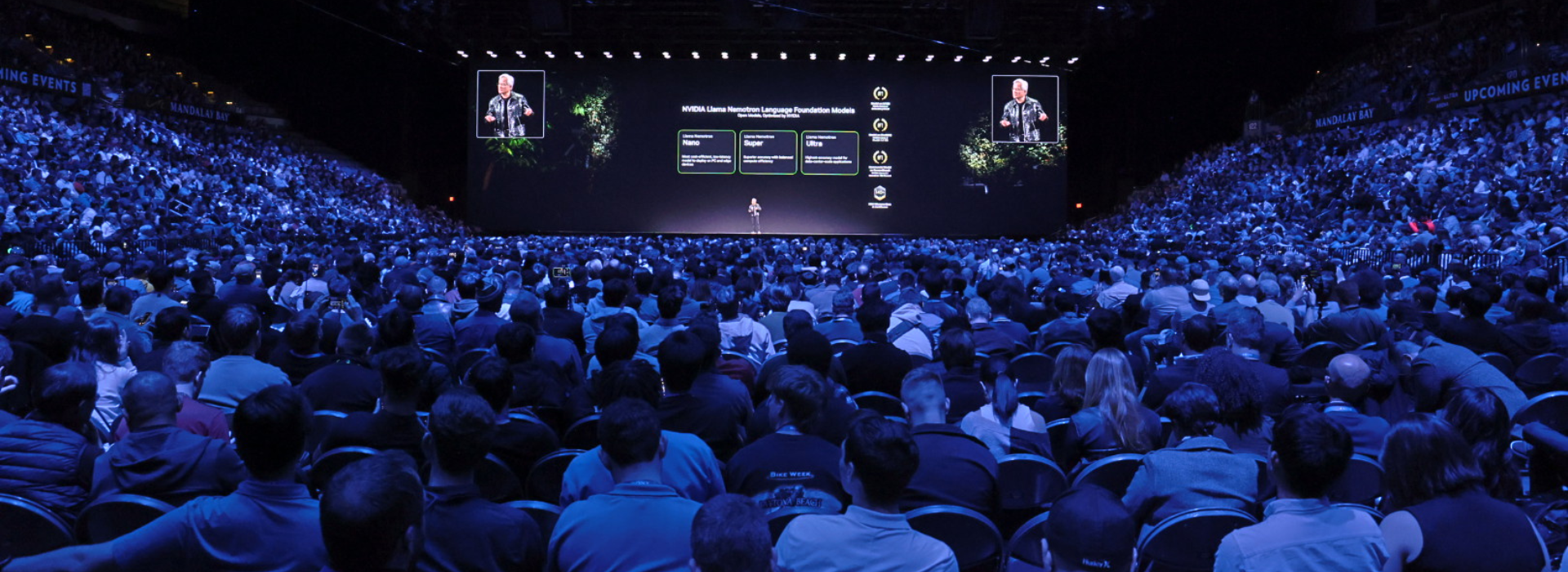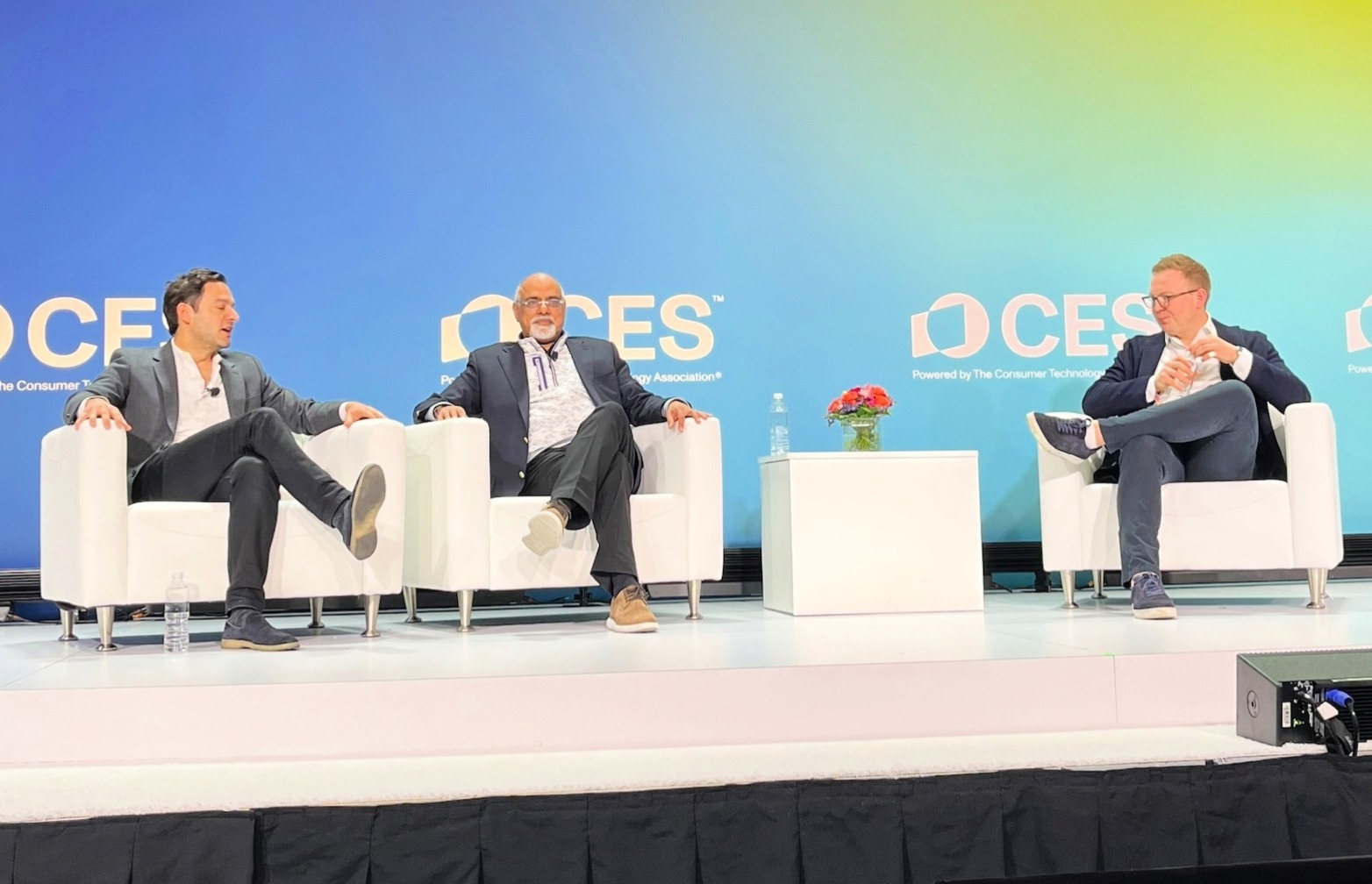CES 2025: Unveiling tomorrow’s tech for home, enterprise and everywhere in between
January 13, 2025 | By Rebecca Oliver DiGenova
Brian Comiskey, who helps run CES 2025, said he “lives at the intersection of ‘what if?’ and ‘why not?’” — perfectly summing up the overarching theme of this year’s massive tech trade show in Las Vegas.
The show, which had no shortage of bleeding-edge technologies and mind-bending futuristic ideas, was all about building an even richer, tech-enabled tomorrow.
Let’s dive into the biggest trends from the show.
01
AI grows from generative to agentic and beyond
AI, especially generative AI, dominated the scene at last year’s CES. This year, more companies are looking beyond generative AI to agentic AI: models that use sophisticated reasoning to solve complex, multi-step problems that current chatbots typically can’t.
In his keynote speech, Nvidia CEO Jensen Huang called the movement to agentic AI “one of the most important things happening in enterprise.” In addition to building the hardware that makes these next-gen models possible, Nvidia also developed AI Blueprints, frameworks for developers to build and deploy custom AI agents.
The company worked with several partners to create five Blueprints, including a video analysis AI agent that can search for relevant information in video archives and create summary reports of videos. Justin Boitano, Nvidia’s vice president of enterprise AI, said in a blog post that the Blueprints “provide the building blocks for developers to create the next wave of AI applications that will transform every industry.”
Another interesting nugget from Huang’s keynote was the exploration of “test-time scaling” — an agentic AI model’s capability of determining how much computing power to devote to a given task. When dealing with complex, multi-step decision-making, knowing when to think harder and calculate longer (and when the results may not justify the effort) could be a game-changer in terms of efficiency.
02
Homes, vehicles and cities get smarter and more connected than ever
One of the Samsung appliances that earned a CES Innovation Award — its 4-Door Refrigerator with AI Home and AI Vision Inside 2.0 — broke free of the home appliance label to be recognized in the AI category. The AI fridge recognizes and tracks food going in and out of it, alerts owners before items expire and manages grocery lists when essentials run low.
For those who find themselves trying to figure out dinner as they drive home from work, SoundHound debuted the first ever “in-car voice commerce ecosystem.” The platform makes it seamless and completely hands-free to find nearby restaurants, place and pay for your order, and navigate to pick up your meal, all using your voice through your car’s infotainment system.
Food orders are just part of the emerging in-car commerce experience. A panel called “Vehicle Payments – The Road Ahead” discussed the potential of using digital payments to allow someone to pay for parking or an event ticket — all without drivers taking their hands off the wheel or eyes off the road.
For those with their sights set on grand-scale smart tech, Toyota provided an update on its futuristic smart city, dubbed “Woven City,” to reflect its three-part network of roadways for pedestrians, high-speed vehicles and lower-speed personal transportation.
Plans for Woven City, in Japan’s Susono City, were first revealed in 2020, and Toyota now says it should be ready for the first residents to move in later this year. The city, which the automaker hopes some 2,000 people may eventually inhabit, is envisioned as an innovation hub for autonomous vehicles, AI and robotics, with next-generation technologies that attend to residents’ safety, social and health needs.
03
Immersive experiences forge valuable connections
Immersive experiences garnered lots of buzz at CES, from augmented and virtual reality for retail shopping to ads embedded right in video games. Josh Simon, vice president of consumer products at Netflix, and Raja Rajamannar, chief marketing and communications officer for Mastercard, teamed up to talk about these new concepts during a CES panel.
Ahead of the release of “Squid Game” season 2 on Netflix, the streaming giant launched a live experience in several cities around the world, where fans could “drop themselves into the world of Squid Game, compete against each other and put themselves to the test,” Simon said. He said these live, immersive experiences fuel fans’ passions for the shows and movies they love, with the company seeing sellout crowds in New York and successful runs in Madrid and Sydney. The experience is coming soon to South Korea, where the show is based.
A new partnership gives Mastercard cardholders access to exclusive benefits to some of Netflix’s other immersive live experiences, including “Stranger Things: The First Shadow” stage play, opening on Broadway in March and the Netflix Bites restaurant in Las Vegas and the first two Netflix House experiential destinations in Dallas and King of Prussia, Pa., all of which are set to open this year. (Panel attendees could sip on two Mastercard and Netflix-inspired cocktails to debut at Netflix Bites: Penelope's Passion, named for the "Bridgerton" character, and Streaming Optimism.)

From left, Josh Simon, vice president of consumer products at Netflix, Raja Rajamannar, Mastercard's chief marketing and communications officer, and Ben Jeffries, CEO of Influencer, on CES's Great Minds stage discussing how to revolutionize customer engagement.
As Rajamannar pointed out, in a hyper-connected world where consumers encounter thousands of ads every day, brand loyalty as we once knew it no longer exists. But brand affinity — the warm, fuzzy feelings or excited anticipation a brand can drum up when it stirs people’s passions — is alive and well in this new age of marketing.
The key to building a beloved brand is earning consumers’ trust. Rajamannar stressed the importance of maintaining a balance of using data to create experiences people will enjoy while still protecting consumers’ privacy by not using personally identifiable information. While respecting their privacy, he said, “We are able to deliver the most relevant experiences in areas consumers are passionate about.”
Banner photo: Nvidia CEO Jensen Huang addresses the CES crowd during his keynote. Photo credit: Consumer Technology Association (CTA)